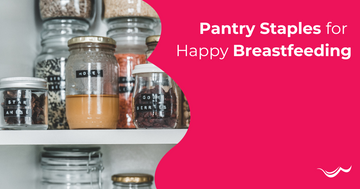
There's no question that breastfeeding is healthy for your baby. It not only provides excellent nutrition, but also promotes your baby’s healthy growth and development.
As a breastfeeding mama, you’re more mindful about the kind of foods and drinks that are best for you. Not only for your baby’s health, but also to support your own health, during a huge adjustment period in your life accompanied by a lack of sleep.
Like most mamas, you probably took prenatal vitamins during pregnancy. To ensure that you were getting all the necessary nutrients for the baby’s development. But did you know, the recommended daily intake of some nutrients actually increases during breastfeeding? Taking prenatal vitamins while breastfeeding is a great way to keep up with the demands of your bub and motherhood.
Why is breastfeeding important to you and your baby?
Watching your baby resting against your breast, suckling rhythmically, and getting an adequate amount of milk, is delightful to watch. It is also a special moment in time as you bond with your baby.
Breastfeeding, as the sole source of nutrition for your baby, has endless benefits. According to the World Health Organisation (WHO), a mama should aim to breastfeed for two years or longer because the benefits continue for that length of time.
Breast milk helps the baby fight off viruses and bacteria, especially in early months. It is packed with antibodies like immunoglobulin A (IgA). That protects the baby by forming a protective layer in its nose, throat, and digestive system.
Breastfeeding also promotes a healthy weight and helps prevent childhood obesity. One study showed that breastfeeding for longer than four months positively impacts weight management. The study states that your gut microbiome affects your entire body, from your hormones to your metabolism.
Thus, breastfeeding influences a child's weight throughout life. It also provides a window of opportunity to shape gut microbiota in early life, a promising tool for allergy prevention.
Meanwhile, one popular and hotly debated topic is how breastfeeding affects a child’s cognitive skills and skills in thinking. As well as processing information, generating ideas, and solving problems. Some studies indicate that breastfeeding makes your child smarter. This is due to the long-chain saturated fatty acids found in breast milk that are integral to brain development.
One of the reasons we put on weight around our hips and thighs during pregnancy, is to provide fat stores to subsequently create breast milk. So don’t be in too much of a hurry to lose weight after having bubs if you want to have a good supply of breast milk!
Do I have to take prenatal vitamins while breastfeeding?
A healthy baby is ready for her first breastfeed within the first hour of being born or the “golden hour.” The baby is placed in “skin-to-skin” contact with the mother until the baby latches himself to the breast and begins to nurse.
After all the waiting, finally, you are now able to bond with your baby. You may be wondering whether you should continue taking prenatal vitamins while breastfeeding.
Health experts recommend that you and your baby are in even better condition if you continue to take your prenatal vitamins after birth.
While nutritious food or having healthy food choices is the best way to get the nutrients for you and your baby, some mothers won't meet the daily recommended nutrients. Further, a lactating mum has an increased need for energy and vitamins from nutritious food.
Here’s a list of vitamins and minerals you need more of while breastfeeding:
Choline
The RDI of choline increases from 440mg during pregnancy to 550mg during breastfeeding. Choline is an essential nutrient for healthy brain development and a deficiency has been linked to long term effects on memory. If you lost a lot of blood during birth or have low iron stores, you may wish to consider boosting both iron and choline with NaturoBest’s Iron & Brain Support.
Vitamin C
The RDI of vitamin C increases from 60mg in pregnancy to 85mg during breastfeeding. Vitamin C plays a role in tissue growth and repair, making it essential for the proper development of a breastfeeding infant. It is crucial to the growth of bones, teeth, and collagen, a protein found in blood vessels, cartilage, tendons, and ligaments. It also helps boost the immune system's ability to fight off disease.
Vitamin B12
Vitamin B12 supports brain development and produces healthy red blood cells. Infants who are vitamin B12 deficient can lead to having permanent brain damage.
Foods containing vitamin B12 are mostly found in foods derived from animals. Including meat, fish, milk and milk products, and eggs. Therefore, infants of vegetarian or vegan mothers may be unable to obtain enough vitamin B12.
Folate
Folate is not just important during pregnancy, it is also required during breastfeeding. The RDI of folate during breastfeeding is 500mcg daily. Folate supports maintaining healthy cells in the body, and it promotes the production of new and healthy cells for your body. Because folate contributes to the healthy development of the brain throughout childhood, your child must get this nutrient from the food they consume outside of the womb, too.
Iodine
Iodine requirements increase from 220mcg during pregnancy to 270mcg during breastfeeding. Iodine supports healthy brain development during both pregnancy and childhood.
When supporting thyroid function, it’s important to look at your intake of zinc and selenium as well as iodine. The RDI of zinc increases from 11mg in pregnancy to 12mg during breastfeeding and selenium increases from 65mcg to 75mcg.
In a nutshell, some vitamins and minerals are needed in even higher proportions in the breastfeeding period than during pregnancy.
When breastfeeding, your top priority is ensuring that your little one can get all the nutrients to thrive. And while having a healthy, well-rounded diet is the ideal way to meet all of your recommended nutrient levels, the prenatal vitamin you took while pregnant can help fill in any nutritional gaps.
Taking prenatal vitamins while breastfeeding is just as important as during pregnancy. In addition to ensuring a healthy mother, these supplements help promote the growth and development of the child.



